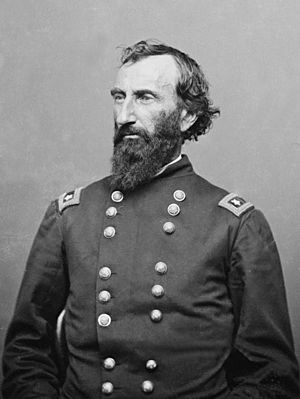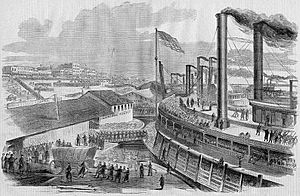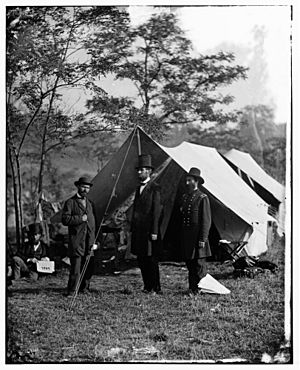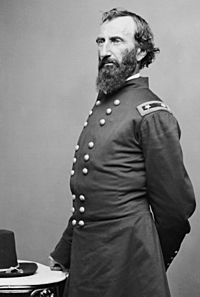John Alexander McClernand facts for kids
Quick facts for kids
John Alexander McClernand
|
|
|---|---|
 |
|
| Member of the United States House of Representatives for Illinois' 6th district | |
| In office November 8, 1859 – October 28, 1861 |
|
| Preceded by | Charles D. Hodges |
| Succeeded by | Anthony L. Knapp |
| Member of the United States House of Representatives for Illinois' 2nd district | |
| In office March 4, 1843 – March 3, 1851 |
|
| Preceded by | Zadok Casey |
| Succeeded by | Willis Allen |
| Member of the Illinois House of Representatives | |
| In office 1840–1843 |
|
| In office 1836 |
|
| Personal details | |
| Born | May 30, 1812 Breckinridge County, Kentucky |
| Died | September 20, 1900 (aged 88) Springfield, Illinois |
| Nationality | American |
| Political party | Democratic |
| Spouses | Sarah McClernand, Minerva McClernand |
| Children | Edward John McClernand |
| Occupation | Military officer |
| Profession | Politician, lawyer |
| Military service | |
| Allegiance | United States of America |
| Branch/service | United States Army Union Army |
| Years of service | 1832, 1861–1864 |
| Rank | |
| Battles/wars | Black Hawk War American Civil War |
John Alexander McClernand (born May 30, 1812 – died September 20, 1900) was an important American lawyer and politician. He also served as a general for the Union Army during the American Civil War. Before the war, he was a well-known Democratic politician in Illinois. He was even a member of the United States House of Representatives. McClernand strongly believed in the ideas of Jacksonian democracy. He also supported the Compromise of 1850, which tried to solve disagreements over slavery.
In 1861, McClernand became a brigadier general of volunteers. He was a "politician-in-uniform," which sometimes caused problems with career military officers. These officers had often graduated from places like the United States Military Academy at West Point. He fought under General Ulysses S. Grant in important battles like Belmont, Fort Donelson, and Shiloh. These battles happened in the Western Theater of the war.
McClernand was a close friend and political supporter of President Abraham Lincoln. Lincoln allowed him to gather his own army to attack Vicksburg, Mississippi. This plan competed with General Grant's efforts. Grant was able to take control of McClernand's independent army after it won the Battle of Arkansas Post. McClernand then became a senior commander in Grant's army during the Vicksburg Campaign in 1863. During the Siege of Vicksburg, Grant removed McClernand from his command. This happened because McClernand shared information with the press without permission. This ended a long-standing rivalry between the two generals. McClernand left the army in 1864. After the war, he worked as a judge and continued in politics.
Early Life and Political Career
McClernand was born in Breckinridge County, Kentucky. His family moved to Shawneetown, Illinois, when he was very young. His early life was similar to that of Abraham Lincoln, another Illinois lawyer. McClernand mostly taught himself and became a lawyer in 1832.
In the same year, he served as a volunteer in the Black Hawk War. Lincoln also briefly served in this war. In 1835, McClernand started and edited a newspaper called the Shawneetown Democrat. As a Democrat, he served in the Illinois House of Representatives in 1836 and again from 1840 to 1843.
Serving in the U.S. House of Representatives
McClernand was a member of the United States House of Representatives from 1843 to 1851. He was known for his powerful speeches. He also strongly followed the ideas of Jacksonian democracy. He disliked abolitionists, which made him popular with his voters. Many of his voters, like him, came from states where slavery was allowed.
McClernand strongly opposed the Wilmot Proviso. This was a proposal to ban slavery in new territories. He was an important helper to Illinois Senator Stephen A. Douglas. Douglas played a key role in creating the Compromise of 1850. McClernand helped Douglas in the House of Representatives during the debates. McClernand also led the Committee on Public Lands from 1845 to 1847. He was on the Committee on Foreign Affairs from 1849 to 1851. In 1850, McClernand decided not to run for re-election. His term ended in 1851.
In 1859, McClernand was elected to the House again. He filled a spot left empty by the death of Thomas L. Harris. His new term started on November 8. He was a strong supporter of keeping the Union together. On July 15, 1861, he introduced a resolution. This resolution promised money and men to the national government. In 1860, he tried to become the Speaker of the House. However, a group of representatives opposed him. They disagreed with his moderate views on slavery and his focus on keeping the Union.
McClernand supported his friend Stephen Douglas in the 1860 presidential election. He helped manage Douglas's campaign. This was during the very divided Democratic presidential nomination convention in Charleston, South Carolina, in 1860.
Family Life
In November 1842, McClernand married Sarah Dunlap. She was from Jacksonville, Illinois. Sarah was a close friend of Mary Todd Lincoln, Abraham Lincoln's wife. Sarah's father, James Dunlap, served in the Union Army. He became a major general. John and Sarah's son, Edward John McClernand, became a U.S. Army brigadier general. He fought in the Indian Wars and later in the Philippines. After Sarah passed away, McClernand married her sister, Minerva Dunlap.
Civil War Service

When the American Civil War began, McClernand formed the "McClernand Brigade" in Illinois. He was made a brigadier general of volunteers on May 17, 1861. His promotion was not just because of his short service in the Blackhawk War. It was also because Lincoln wanted to keep good political ties with Democrats in Southern Illinois. He left his job in Congress on October 28.
McClernand was second in command under General Ulysses S. Grant. This was at the Battle of Belmont in Missouri on November 7, 1861. He also led the 1st Division of Grant's army at Fort Donelson. On February 15, 1862, his division was attacked by surprise. They were pushed back almost two miles before he got help. On March 21, he was promoted to major general of volunteers for his actions at Fort Donelson. At the Battle of Shiloh on April 6–7, he commanded a division. His division, along with General William Tecumseh Sherman's, fought hard against strong Confederate attacks.

McClernand's time as a major general was affected by political actions. Other generals often disliked this. He spoke directly with President Lincoln, his commander-in-chief. He criticized the plans of other generals, including General George B. McClellan in the East. He also criticized Grant's plans in the West.
In October 1862, McClernand used his political influence. He got permission from Illinois Governor Richard Yates to visit Washington, D.C., and President Lincoln. He hoped to get an important independent command. Secretary of War Edwin Stanton agreed to send him north. His mission was to gather troops for an attack on Vicksburg.
In early January 1863, at Milliken's Bend, McClernand took over from Sherman. He became the leader of the force moving down the Mississippi River. On January 11, 1863, he captured Arkansas Post. Sherman had suggested this attack. On January 17, Grant took command in person. He combined some of his own troops with McClernand's. This happened after Admiral David Dixon Porter and General Sherman said McClernand was not good enough to lead more operations. Three days later, Grant ordered McClernand back to Milliken's Bend.
During the rest of the Vicksburg Campaign, there was a lot of tension between McClernand and other generals. He tried to get Grant removed. He spread rumors to the press that Grant was drinking during the campaign.
McClernand's soldiers landed on the Mississippi River levee at Young's Point. They suffered from the cold winter rains and had no proper shelter. Tents were not given out because they were close to Confederate guns at Vicksburg. So, soldiers dug holes in the levee and covered them with rubber blankets. Many soldiers got sick from the deep mud and tiredness. There were many cases of smallpox. Hospital tents were full of thousands of sick men. Many died, and soon the levee was covered with new graves.
Grant believed that McClernand was slow at Champion Hill (May 16, 1863). But Grant waited for a clear act of disobedience. This would give him a reason to remove his politically powerful rival. After a bloody and failed attack on Vicksburg (ordered by Grant), McClernand wrote a congratulatory message to his corps. This message was published in the newspaper. This went against an order from the department and another from Grant. He was removed from his command on June 18. This was two weeks before Vicksburg fell. Major General Edward O. C. Ord replaced him.
President Lincoln understood the importance of keeping a good relationship with leaders like McClernand. So, he gave McClernand a field command again in 1864. On February 20, 1864, McClernand returned to his old XIII Corps. This corps was now part of the Department of the Gulf. Illness limited his role. By the time the Red River Campaign started, Thomas E. G. Ransom had replaced McClernand in command. For a few days in late April, McClernand returned to the field. He commanded two divisions from the XIII Corps in the Red River Campaign. He left the army on November 30, 1864. In April 1865, he played an important part in the funeral of Lincoln, his old friend.
Later Life
In 1871, at the 17th Annual Illinois State Fair, McClernand's horse, Zenith, won first place. It was in the "Best Stallion Colt, 2 Years Old" group. The prize was $25. McClernand served as a district judge in the Sangamon (Illinois) District from 1870 to 1873. He was also president of the 1876 Democratic National Convention. McClernand's last public service was on a federal board. This board oversaw the Utah Territory. Even though he resigned from the army, he received an Army pension. This was due to a special act of Congress.
John McClernand died in Springfield, Illinois. He is buried there at Oak Ridge Cemetery.
In Fiction
McClernand is a character in MacKinlay Kantor's alternate history book If the South Had Won the Civil War. In this story, General Grant is accidentally killed at the start of the Vicksburg Campaign. McClernand then takes command. However, his very bad leadership causes the campaign to fail. The Army of the Tennessee is almost completely destroyed. This helps the Union lose the war, and the Confederacy gains independence.
Images for kids
See also
 In Spanish: John Alexander McClernand para niños
In Spanish: John Alexander McClernand para niños
 | William L. Dawson |
 | W. E. B. Du Bois |
 | Harry Belafonte |



